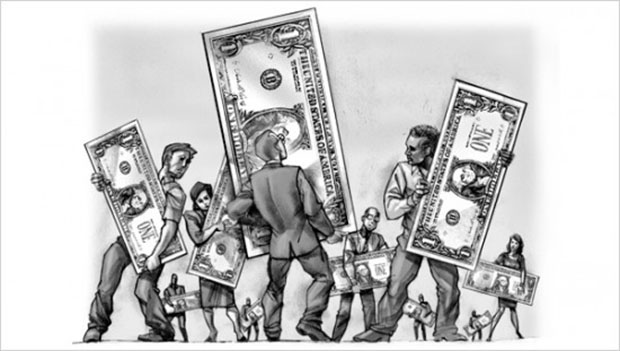Jean Twenge is a professor at San Diego State University, and best known for books like Generation Me and The Narcissism Epidemic. Now she has some new research out on the connection between rising income inequality (well-documented) and eroding social capital (i.e. trust). The research is summarized in Fast Company along these lines:
To Twenge, the last decade’s rapidly fading confidence in all institutions–including the medical establishment, despite major advances in health care–came as a surprise. Compared to Watergate and the Clinton years, Twenge argues that institutional scandals of the 21st century of late have been downright mild. “You look at this time period, where you don’t have [too many] major scandals, not a very high crime rate, and yet you find this low trust in others,” Twenge says. “It’s a little bit of a mystery. So you have to ask: What’s common about this time period?”
High measures of income inequality and poverty were both factors that synced up with the trend, even when Twenge controlled for other important variables. “It could be that in a society that is less equal, people are less willing to trust others,” Twenge says. “It may seem unfair that the rich are getting richer, and the poor are getting poorer. There has been more attention paid to that. The phrase ‘the 1%’ didn’t exist five years ago.”
Probably the most important initial thing to remember is the ol’ standby about correlation and causation. There’s really no way to prove that rising income inequality has caused an erosion of trust, but it certainly could be one factor at play. (“Trust,” in and of itself, is a pretty big concept to define and contextualize anyway.)
I think there was a little bit of a sense that the 2008 downturn was caused by people being greedy — simplistic, but true on surface — and so the idea coming out of it was that things might be kept in check a little bit more. Actually, that didn’t happen. The rich got richer and the poor got poorer — generally speaking, of course — coming out of the recession, and that could be factoring in to people’s overall lack of trust in their relationships (kind of a “F*ck it all!” attitude, in a way).
Interestingly, comedians like Jon Stewart, Stephen Colbert and John Oliver have come to prominence in the same time period Jean Twenge is researching; those are guys whose humor largely comes from skewering how ridiculous the decisions of some large organizations / rich people truly are. In the 1970s, there were counter-culture comedians, sure, but could a Jon Stewart have become as popular as he has today? Probably not. As a result, you could look at the elements of pop culture that have sprung up against this income inequality divide and say, “Well, that’s evidence that people really want that other voice, that voice to show just how asinine some of this stuff is.” Again, correlation — but interesting.
People are always worried about what will happen to the global economy because of income inequality / future recessions, and that is a valid question — but maybe we should be looking a little more at what could happen to societal fabric as a result too.
